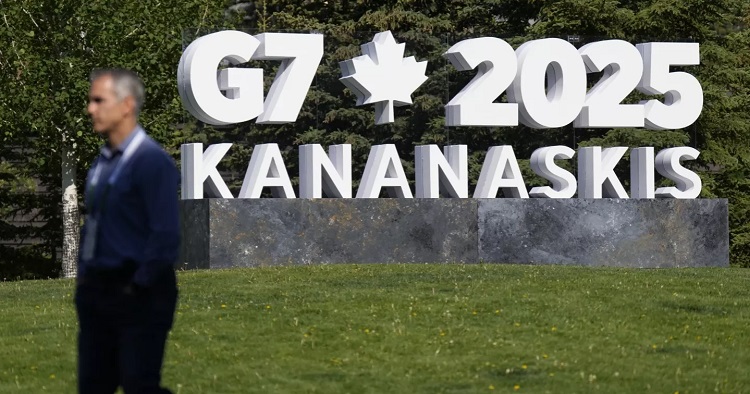G7 summit opens in Canada amid Israel-Iran conflict, global trade tensions


Leaders from the Group of Seven (G7) nations convened Sunday in the Canadian Rockies for a high-stakes summit dominated by growing concerns over the Israel-Iran conflict and ongoing global trade disputes.
The summit opened under the shadow of a dangerous escalation between Israel and Iran, with reports confirming that Israel launched major strikes on Iranian targets, prompting retaliatory attacks from Tehran. The crisis appeared to catch many world leaders off guard.
A U.S. official disclosed that President Donald Trump had recently vetoed an Israeli plan to assassinate Iran’s Supreme Leader Ayatollah Ali Khamenei, highlighting the intensity of Israel’s military intent.
British Prime Minister Keir Starmer, who had discussed the crisis with both Trump and Israeli Prime Minister Benjamin Netanyahu ahead of the summit, said he expected “intense discussions” to continue throughout the gathering.
Trump's unpredictability shapes summit tone
Canadian Prime Minister Mark Carney, hosting the summit, has opted against issuing a joint communique, a long-standing G7 tradition, citing diverging views—particularly those of U.S. President Trump, who has unsettled allies with threats of tariffs and provocative statements.
French President Emmanuel Macron made a symbolic stop in Greenland before arriving in Canada, issuing a firm statement rejecting Trump’s comments suggesting the U.S. might try to “buy” or claim Greenland. “Greenland is not for sale, and certainly not to be taken,” Macron said, winning applause from locals.
Trump arrived in Alberta late Sunday and is scheduled to hold bilateral talks with Carney on Monday before formal sessions begin.
Wider participation, same tensions
Leaders from India, Ukraine, Brazil, South Africa, South Korea, Australia, Mexico and the UAE have also been invited to the summit. Trade remains a central issue, especially amid Trump’s aggressive tariff threats.
Before departing Washington, Trump hinted that new trade agreements could be announced during the summit. “We just send a letter: ‘This is what you’ll pay,’” he remarked, referring to his administration’s trade tactics.
However, bilateral meetings with Trump have been difficult for some leaders. He has previously been accused of attempting to pressure counterparts from Ukraine and South Africa during private talks.
Former Canadian Prime Minister Jean Chrétien advised leaders to remain composed in the face of potential provocations. “If Trump tries to create a scene for attention, let him. Stay calm and carry on,” Chrétien told a recent panel.
While the U.K. and U.S. reached a preliminary trade deal last month—reducing tariffs on vehicles, steel, and aluminum—it has yet to be implemented. U.K. officials remain confident it will proceed.
Starmer, however, faces criticism, particularly from Canadians, for not addressing Trump’s controversial remarks suggesting Canada should become the 51st U.S. state. Asked about it, Starmer stated, “Canada is an independent, sovereign country and a much-valued Commonwealth partner.”
Zelenskyy and Trump set to meet again
Ukrainian President Volodymyr Zelenskyy is also expected to meet Trump during the summit, marking their first encounter since a tense Oval Office meeting earlier this year.
Starmer met with Carney in Ottawa before the summit to discuss trade and security. It was the first visit by a U.K. prime minister to Canada in eight years.
German officials downplayed speculation that the summit would turn into a “G6 versus Trump” scenario, noting internal differences exist among all member states.
Still, Chrétien warned that Trump’s unpredictability remained a challenge. “The only thing you can’t predict is what the U.S. president might do based on his mood or desire to dominate headlines,” he said.
